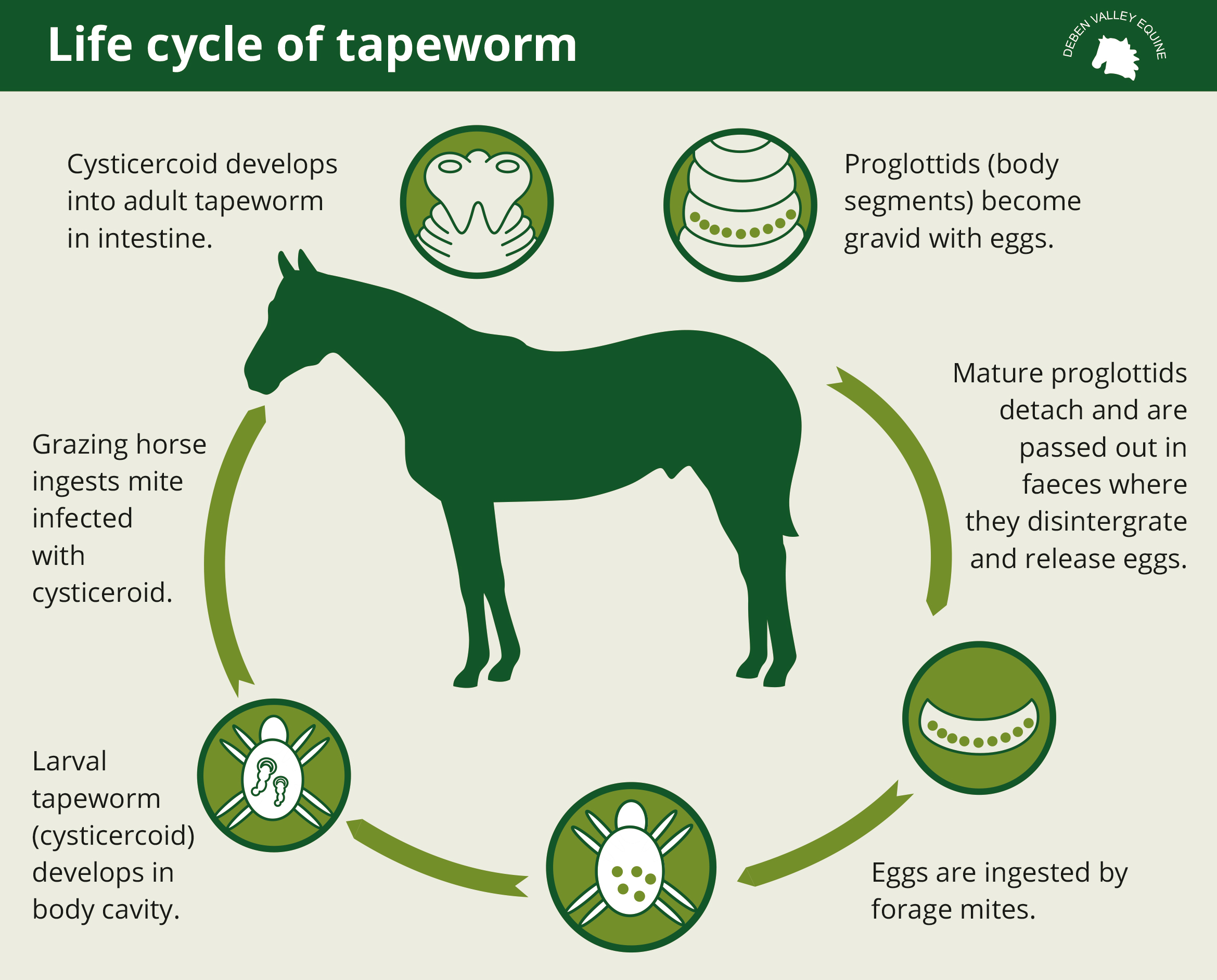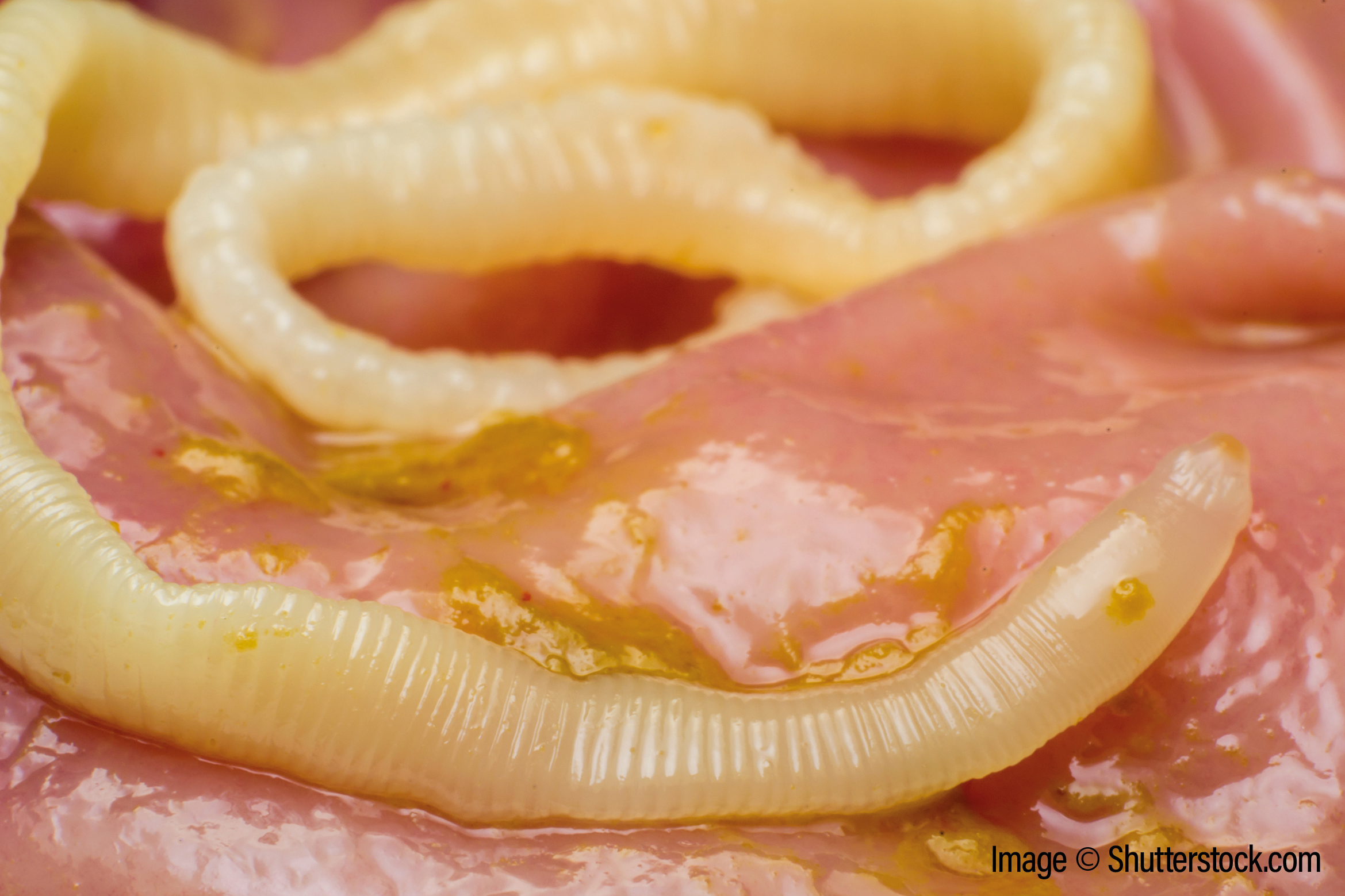COLIC WARNING
Tapeworm should be considered a significant pathogen in young horses: findings presented at recent equine colic symposium
Tapeworm infections were found to be a significant concern in horse management when colic cases in four yearlings were investigated.
The individual colic cases occurred over several years (one in 2014, and three in 2019/2020) at a well-managed Thoroughbred stud farm. Two of the yearlings required euthanasia while two made a full recovery. Post mortem/laparotomy examinations of three yearlings revealed large live tapeworm infections, and three of the cases suffered ileocaecal intussusception; where a section of the intestine slides inside an adjacent section. This was despite the yearlings being treated with praziquantel (tapeworm treatment) at 6 and 12 months of age.
The most concerning finding was that two of the live tapeworm infections were discovered just days after the yearlings had received the praziquantel dose, therefore raising suspicions of praziquantel resistance (meaning the drug would no longer kill tapeworms).
During 2019, all 15 yearlings on the stud farm were tested using the EquiSal Tapeworm saliva test and were all found to have high ‘saliva score’ results, therefore demonstrating significant tapeworm-specific antibody responses. Repeat testing over 14 weeks after treatment showed seven yearlings with reductions in specific antibody levels, but five yearlings remained the same or increased. The only yearling to reach ‘low’ diagnosis after treatment was a filly who had previously spent time on box rest without access to grazing. It is expected that significant reductions in EquiSal saliva scores will occur within two to three months of treatment providing there is no reinfection or evidence of resistance. Research conducted by the EquiSal team has shown that in horses where tapeworm reinfection is prevented (by restricting access to grazing), 90 % of horses in the study (19) reduced to low within 10 weeks and all had reduced to low within 12 weeks.
At Deben Valley Equine, EquiSal tests are available to buy individually or as part of our annual worming programme.
Jess Spanton, the lead veterinary surgeon, commented, “While this case study hasn’t generated firm conclusions of praziquantel resistance, the large live tapeworm infections discovered days after treatment are very concerning, suggesting that a level of resistance to anti-tapeworm treatments is a strong possibility. Tapeworm infections in horses, and in particular youngstock, should be closely monitored to prevent horses suffering clinical disease, which in some cases can be severe. The benefit of testing for tapeworm is that anti-tapeworm dosing frequency and management practices can be altered in response to results, and in some cases may identify whether there is a potential for resistance.’
Dr Corrine Austin, founder of EquiSal Tapeworm testing, said “It is very common for horses in high risk environments, such as youngstock or herds with existing tapeworm infections, to have high EquiSal results despite receiving 6 monthly doses of anti-tapeworm treatment. Our research has shown that this is usually due to rapid reinfection from the pasture after treatment. More frequent saliva test monitoring and subsequent treatment is essential to manage horses at risk of developing clinical symptoms. Just as important is identifying horses which don’t need treatment – approximately 70% of those tested – meaning the only two drugs we have available for treating tapeworm can be saved for when they are really needed, thus slowing the development of resistance.”

Mites are found on grazing & in straw / hay / bedding.
Tapeworm and Horse Health
Tapeworm infections can pose a significant threat to horse health, as they have been associated with various clinical cases of colic and intestinal obstruction, as follows:-
- Intussusception, a form of colic where one part of the intestine telescopes into another
- Caecal perforation or rupture, leading to peritonitis, wherein contents of the caecum leak out and cause infection of the abdominal cavity (peritoneum)
- Thickening of the ileo-caecal junction and mucosa, leading to intestinal obstruction due to the gut in this area moving abnormally
- Intestinal obstruction, as above and can be caused by a large mass of tapeworms blocking the junction between the small and large intestine
- Ileal or caecal torsion, meaning twisting of the intestines causing severe pain and obstruction.
Horses may present with recurrent colic over a few weeks, with bouts becoming more frequent and more severe. Alternatively, there may be a sudden onset of colic with severe pain. The most common problem is a mild colic due to the constricted nutrient flow as the contents of the intestines get backed up.
Larger tapeworm burdens are more likely to be of clinical significance, but even moderate burdens can result in damage to the intestinal mucosa. It has been shown that the higher the infection site in the gut, the more likely the horse is to suffer from colic. Due to the small intestinal region in which tapeworms attach – the ileo-caecal junction – tapeworms tend to cluster close together, so combining into a mass large enough to cause severe lesions.
Given the correlation of infection intensity to horse intestinal health, and concerns for dewormer resistance, there is an increasingly recognised need for accurate diagnostic tests.
How many horses have a tapeworm burden?
Of horses tested to date, only a quarter have an infection requiring treatment. This finding suggests that a huge number of horses (approximately 3/4) are receiving routine tapeworm treatment when they don’t need it.
From EquiSal (Austin Davis Biologicals Ltd)
February 2022
